- TROOPING THE COLOUR (or COLOR)
- In UK usage and some others, a military ceremony at which the colour is marched past assembled troops
(see also colour 2),
colours 2), dipping 1)
and practice colours.
![[Trooping the Colour]](../images/v/vx-troopcol.jpg)
1st and 2nd Battalion Grenadier Guards (hippostcard.com)
Please note that this ceremony began in the 17th century, when a regiment’s colours were
marched slowly past assembled troops so that they could recognize them in battle – it is now
used to mark the official birthday of HM The King.
- TROPHY FLAG
- A flag captured in battle and displayed as a trophy – a captured flag
(see also stand 2)).
![[Trophy flag]](../images/v/vx-it1941_s.jpg)
![[Trophy flag]](../images/v/vx-vn1946_s.gif)
![[Trophy flag]](../images/v/vx-gb1982_s.jpg)
South African soldiers with Italian Flag
in Ethiopia/Italian East Africa, 1941;
French soldiers with Viet Minh Flag in Indochina, 1946–54;
Argentine soldiers with Union Flag on Falkland Islands, 1982
(militaryimages.net)
- TRUCK
- 1) The wooden block or metal plate at the top of a flagpole (or mast) below
the finial, which includes a pulley (sheaved block) or a hole for the halyard
– often incorrectly used as a synonym for the ball or other finial at the top
of that flagpole (see also Appendix I,
finial,
flag pole,
halyard and
sheaved block).
- 2) A short pole flexibly mounted on top of a mast for the flying of a flag
or pennant at sea and ashore – a pigstick (see also
masthead, at the).
- TRUMPET BANNER
- See bannerette.
![[trumpet banner]](../images/v/vx-gb^de7grpb.gif)
Trumpet Banner of 7th Duke of Edinburgh’s Own Gurkha Rifles, UK
- TUFA
- A tuft of hair, feathers or other similar materials used in the same manner
as a flag (see also vexilloid 1)).
Please note that the term is taken from the ancient Roman tufa which is considered to
have been a helmet crest, and to have been adopted in Britain as the tuuf.
![[tufa]](../images/v/vx-tufa.jpg)
(etsy.com)
- TUGH
- 1) An Ottoman vexilloid, now obsolete, of Mongoloid/Turkic origin that symbolized
civil or military authority, and consisted of a number of yak or horsetails at the top
of a staff – a horsetail standard (see also
horsetail,
standard 5) and
vexilloid 2)).
- 2) See toug.
Please note that the schellenbaum (also known as a jingling jonny) in use by German Army
bands and some others, although also descended from the Ottoman horsetail standard,
is a musical instrument and not a vexilloid.
![[Schellenbaum]](../images/v/vx-schellenbaum.jpg)
Schellenbaum (National Music Museum)
- TWIN SALTIRES
- The term to describe two saltires, placed (usually diagonally) in the same panel – a double
cross. See double cross 2).
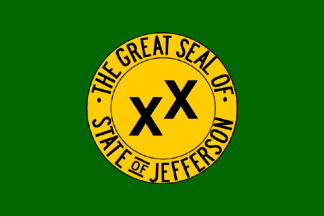
Flag of the Independent State of Jefferson 1941
- TWO-AND-A-HALF ARMED CROSS
- The term used in Eastern European heraldry – and a direct translation of the Polish
póltrzecia krzyza – that describes a Cross of Lorraine which has a third arm
projecting on one side only – usually the sinister (see also cross 2),
cross of Lorraine,
orthodox cross and
papal cross).
wj.gif)
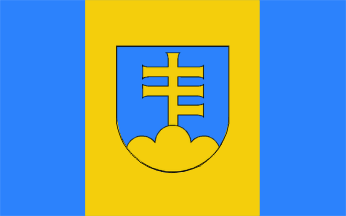
Arms and Flag of Wojaszówka, Poland
- TWO or THREE POINTED
- See broad pennant,
double-pointed,
swallow-tail(ed),
swallowtail and tongue,
triple-tailed 1),
triangular tailed and the note below.
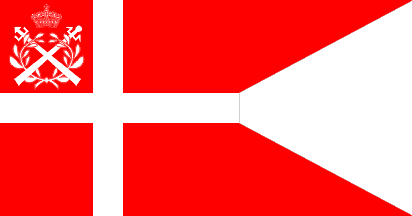
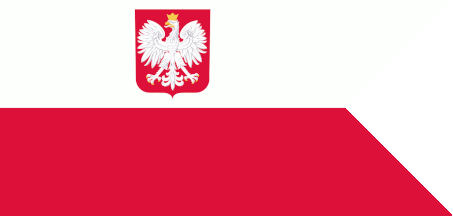
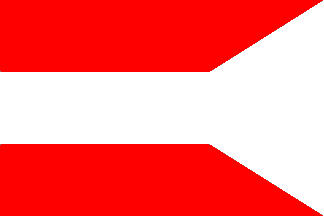
Customs Flag, Denmark);
Naval Ensign, Poland;
Flag of Zákamenné, Slovakia
Please note (as may be seen from the references given above) that flags/pennants with two or three
tails/tongues have many specific variants and it is strongly suggested that the individual entries be
consulted before attempting any description.
- TWO-SIDED
- 1) A term used when the reverse of a flag differs from its obverse – but see the note below
(also mirror image,
obverse, reverse).
- 2) See double-sided 1).
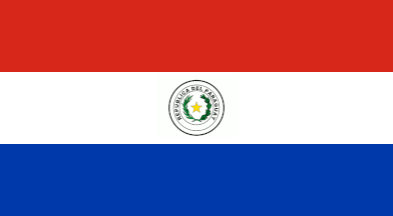
.gif)
.gif)
The National Flag of Paraguay
with enlarged detail of the emblems on the obverse and on the reverse
Please note with regard to 1) that this term can include those flags where most of the
reverse is a mirror image of the obverse – for example those of Argentina, Egypt and
Brazil – but where the detail such as lettering or a charge, is made so that it can be
seen correctly on both sides.


The Globe as it should appear on both the obverse and reverse of
the National Flag of Brazil
- TYPE FLAG
- See model flag.
![[Establishment of arms example]](../images/v/vx-ca-yt.gif)
Flag of Yukon Territory, Canada (Design Details Established by
Type/Model Flag)
![[Trooping the Colour]](../images/v/vx-troopcol.jpg)
![[Trophy flag]](../images/v/vx-it1941_s.jpg)
![[Trophy flag]](../images/v/vx-vn1946_s.gif)
![[Trophy flag]](../images/v/vx-gb1982_s.jpg)
![[trumpet banner]](../images/v/vx-gb^de7grpb.gif)
![[Schellenbaum]](../images/v/vx-schellenbaum.jpg)

wj.gif)





.gif)
.gif)


![[Establishment of arms example]](../images/v/vx-ca-yt.gif)

![[tufa]](../images/v/vx-tufa.jpg)